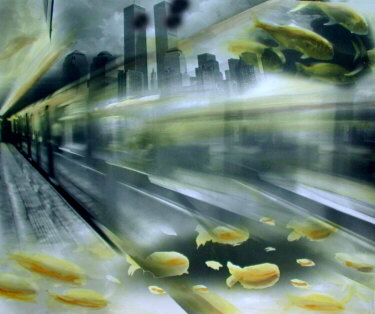 September 06
September 06
What is Terrorism, and Why We Need to Define It
by Dr. Dan Friedman
p. 3 of 3
Since terrorism is symbolic, and its actual victims only stand-ins for the larger intended pool of victims, an effective "war on Terror," i.e., a war on militancy, must be fought on three separate fronts: law enforcement, legislative process, cultural advocacy. Put another way, we need to defend our societies from illegal acts of violence, implement and improve the reasons why our societies deserve to be defended, and explain or demonstrate those reasons.
During the Cold War, the USA won the war of marketing. Despite the brutal Stalinist massacres, purges, and oppressions of the USSR, it was by no means clear that the union founded by the people’s revolution against the Tsar would lose a war of ideas to a country barely emerging from the shadow of racially discriminatory voting laws run by a moneyed white elite.
 Now, however, America is badly losing the marketing battle. For Americans, 9/11 was a savage attack on what has become known in the US as the “homeland;” for much of the world it was a blow (notwithstanding its wickedness) to the hubris of a country whose national baseball championship is the World Series, and who built this World Trade Center and World Financial Center in its own backyard. My point, like that of Hirst, is not that the terrorists were justified (they were not, they are not) but that they were, like an artwork, effective in a symbolic way. The response of the West to that attack and to others that followed have been ineffective symbolically leaving audiences of the world, as a consequence, extremely sensitive to militancy. I believe that the western democracies are far from perfect but have right on their side, but – the merits of the draconian security measures (the Patriot Act in the US, the Anti-Terrorism, Crime and Security Act (ATCSA) in the UK, the Anti-Terrorism Act in Canada etc.) wars and nation-building in Iraq and Afghanistan aside – we have not shown it symbolically. What we have shown is not engagement with ideas, but imposition of our pre-existing beliefs through power, domestically and internationally. We have tightened our second half of the chain and, rather than it strengthening us, it has made us more vulnerable.
Now, however, America is badly losing the marketing battle. For Americans, 9/11 was a savage attack on what has become known in the US as the “homeland;” for much of the world it was a blow (notwithstanding its wickedness) to the hubris of a country whose national baseball championship is the World Series, and who built this World Trade Center and World Financial Center in its own backyard. My point, like that of Hirst, is not that the terrorists were justified (they were not, they are not) but that they were, like an artwork, effective in a symbolic way. The response of the West to that attack and to others that followed have been ineffective symbolically leaving audiences of the world, as a consequence, extremely sensitive to militancy. I believe that the western democracies are far from perfect but have right on their side, but – the merits of the draconian security measures (the Patriot Act in the US, the Anti-Terrorism, Crime and Security Act (ATCSA) in the UK, the Anti-Terrorism Act in Canada etc.) wars and nation-building in Iraq and Afghanistan aside – we have not shown it symbolically. What we have shown is not engagement with ideas, but imposition of our pre-existing beliefs through power, domestically and internationally. We have tightened our second half of the chain and, rather than it strengthening us, it has made us more vulnerable.
Perhaps unsurprisingly, filmmakers, more than politicians, understand terrorism as spectacle, and the media's role in it. For example, in Steven Spielberg’s recent film Munich the initial sequence weaves the global media coverage of the 1972 Olympics into the opening action of the film, implicating international television especially in those terrorist events. In his main departure from George Jonas’ book on which it is based (Vengeance: The True Story of an Israeli Counter-Terrorist Team), Spielberg suggests that the establishment of the global media – spanning Europe, Israel, America, and the Arab world – is what marks the current period of terrorism from previous periods. No longer are attacks staged purely for a local population: all attacks are both local and global. At the start of the film action shifts back from the events in Germany to their reception by Israelis, Arabs, and Americans. In each of the different countries the commentary and subtitles put a different spin on the images – explaining, on many occasions incorrectly, what the images mean, whilst purporting to be purely factual. What is more telling than either images or spin, however, is the involvement of the television in the events, not only for the viewers but also for the protagonists. Media is not only global it’s also instantaneous and being beamed not only across the world but also onto the television within the apartment where Black September was holding the Israeli athletes. Although previously well documented, the failed rescue attempt is framed here by Spielberg as part of the complicity of the media in the culture of terrorism. This is not to say that the networks deliberately foiled the attempt to storm the apartment by showing pictures of fake athletes carrying guns into position and snipers taking up position on surrounding roves. Rather they were in positions where they could hardly help but affect the action and its reception. The conflict is both formed and framed by its coverage. Munich pairs pictures of the dead athletes on public television with pictures in a private room being sorted for assassination – assassinations for public consumption. Retribution, as the Israeli war council is portrayed as saying, is not about Arabs in training camps (already bombed quietly) but about fixing the world’s attention.
Although reiterated by Spielberg for this generation, the dichotomy of local and global mediated and homogenized by mass media was recognized earlier by John Frankenheimer in Black Sunday (1976), a thriller made in the post-Munich era of terror. Again drawing on a set of global and historical injustices Vietnamese, Japanese, Germans, and Arabs join together in planning an attack on America that is designed to wreak maximum havoc on primetime television. Uncannily presaging the death-from-the-air of 9/11, the Goodyear blimp threatens death when it jettisons its usual TV cameras to shoot the event with 250,000 steel darts. Dahlia Iyad (Marthe Keller) expresses the symbolic nature of the equality to which militants aspire and hope that this action will lead: “The American people have remained safe through all the cries of the Palestinian people. People of America, this situation is unbearable for us. From now on, you will share our suffering.” As always, Palestinians are a cipher for the oppressed of the world and it is the militants’ aim to make Americans feel their pain.
Until western polities find a symbolic language, or languages, to express their meaning, or meanings, and inspire the world in a more substantial way than the hollow repetition of the word “democracy” we will continue to lost the initiative in the global struggle between moderates and militants. We are in real danger of seeing terror move away from fanatic terrorist sects with fairly well-defined aims to the fantasy affiliations of the Columbine demographic. The current bland homogeneity of corporate-sponsored youth culture with its processes of instant appropriation is in danger of making terror – that which cannot be appropriated by the establishment – the new rock ‘n’ roll. Opposing this is not merely the job of politicians, it is the job of artists, musicians, writers. Forget patriotic spending, not selling out is now a cultural imperative.
3. Conclusion: Violence Works
Violence works. If violence did not work it would be easy to condemn -- as lazy or ignorant, as well as immoral. But in fact, militancy is perpetuated because it is, historically speaking, effective. In those cases where violence does prove effective those who use it win power for themselves or their allies who then, from a more established and historical position, talk of their previous violent actions as part of a necessary struggle. In this way violence is inscribed into politics as an acceptable, and even glorious, necessity. As Hannah Arendt puts it “the practice of violence changes the world, but the most probable change is to a more violent world.”
The long-term problem that ‘terrorism’ poses is the disturbance of international politics as the crude nineteenth century political tool – the nation-state – breaks down. Slowly, but inexorably, the nation-state is being colonized, replaced, or appropriated: by non-representative organizations like GATT or the WTO, through local self-governance, by supranational bodies like the EU and the UN, and finally by the extremely violent and marginalized bodies like the Janjaweed, Al-Qaeda, even Robert Mugabe’s Zanu PF. These latter bodies and the strategies to oppose them can have a disproportionate (and unfair) influence on the shape of the new governing structures that are developing, and on the rigidity of the old ones, preventing their smooth transition.
When political regimes are overthrown by force – for better or for worse – violence is inscribed into the body politic. Once that happens it is difficult to gain legitimacy untainted by the influence of violence. Roberto Calasso traces some of the historical difficulties of legitimacy in his oddly powerful, and unclassifiable work, Ruins of Kasch. Political power relies on the proof of brute force and that means occasionally showing force which makes its existence hard to deny. If you are in charge of a regime or a system of government that traces its legitimacy to violent overthrow (a revolution, a civil war, a war of independence, a coup, a war of conquest) it is difficult to argue against the possibility of a ‘just violence.’ As Shakespeare puts it “This even-handed justice/ Commends the ingredients of our poison’d chalice/ To our own lips.” (Macbeth I vii)
The attacks themselves provide an occasion for legal prosecution and for outrage but, because terrorism works through symbolic effects, often the more ‘legal’ an attack, the less the outrage and the less the success. Thus the way to deal with this newly virulent type of political violence is to disaggregate and normalize it. This would seem to be impossible, since terrorism seems, on the face of it, to be incomprehensibly unacceptable -- unthinkable, in a certain way. However, it is not really unthinkable, and ought to definable precisely in order to neuter its symbolic effect. Once the crimes are understood as “inciting religious or racial hatred,” “causing damage to property,” “endangering human life,” “slander,” or any of the other usual crimes or calumnies committed by militants, they are no longer beyond the pale of understanding and lose symbolic potency.
Such a definition is unlikely to happen, because it would undermine the current state of affairs, in which, like Humpty-Dumpty, politicians can label as terrorism anything they like. What Humpty-Dumpty is really asking for, in his refusal to define his terms, is power -- the power to shape reality through language, rather than work within an agreed upon framework of concepts and coherence. As Humpty himself said, “The question is… which is to be master - that's all.”









